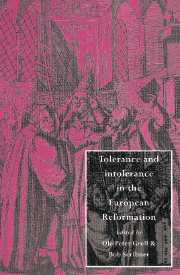Book contents
- Frontmatter
- Contents
- List of contributors
- Preface
- Dedication
- 1 Introduction
- 2 The travail of tolerance: containing chaos in early modern Europe
- 3 Preconditions of tolerance and intolerance in sixteenth-century Germany
- 4 Heresy executions in Reformation Europe, 1520–1565
- 5 Un roi, une loi, deux fois: parameters for the history of Catholic-Reformed co-existence in France, 1555–1685
- 6 Confession, conscience and honour: the limits of magisterial tolerance in sixteenth-century Strassburg
- 7 One Reformation or many? Protestant identities in the later Reformation in Germany
- 8 Toleration in the early Swiss Reformation: the art and politics of Niklaus Manuel of Berne
- 9 Tolerance and intolerance in sixteenth-century Basle
- 10 Exile and tolerance
- 11 The politics of toleration in the Free Netherlands, 1572–1620
- 12 Archbishop Cranmer: concord and tolerance in a changing Church
- 13 Toleration for Catholics in the Puritan revolution
- 14 The question of tolerance in Bohemia and Moravia in the age of the Reformation
- 15 Tolerance and intolerance in sixteenth-century Hungary
- 16 Protestant confessionalisation in the towns of Royal Prussia and the practice of religious toleration in Poland-Lithuania
- Index
1 - Introduction
Published online by Cambridge University Press: 07 December 2009
- Frontmatter
- Contents
- List of contributors
- Preface
- Dedication
- 1 Introduction
- 2 The travail of tolerance: containing chaos in early modern Europe
- 3 Preconditions of tolerance and intolerance in sixteenth-century Germany
- 4 Heresy executions in Reformation Europe, 1520–1565
- 5 Un roi, une loi, deux fois: parameters for the history of Catholic-Reformed co-existence in France, 1555–1685
- 6 Confession, conscience and honour: the limits of magisterial tolerance in sixteenth-century Strassburg
- 7 One Reformation or many? Protestant identities in the later Reformation in Germany
- 8 Toleration in the early Swiss Reformation: the art and politics of Niklaus Manuel of Berne
- 9 Tolerance and intolerance in sixteenth-century Basle
- 10 Exile and tolerance
- 11 The politics of toleration in the Free Netherlands, 1572–1620
- 12 Archbishop Cranmer: concord and tolerance in a changing Church
- 13 Toleration for Catholics in the Puritan revolution
- 14 The question of tolerance in Bohemia and Moravia in the age of the Reformation
- 15 Tolerance and intolerance in sixteenth-century Hungary
- 16 Protestant confessionalisation in the towns of Royal Prussia and the practice of religious toleration in Poland-Lithuania
- Index
Summary
Within the historiography of religious tolerance the Reformation era has always been considered of paramount importance for the developments which led to the achievement of ‘a liberal and tolerant society’. This was, of course, a highly valued goal for the educated elite in nineteenth-century Western Europe and has subsequently influenced a later period's scholars in their inquiries and judgements. Evidently the break-up of the near monolithic structure of medieval Western Christianity for the first time presented contemporary lay and ecclesiastical rulers with the practical problem of how to deal with religious plurality. Likewise, this fragmentation gave rise to a growing debate about aspects of religious toleration, such as freedom of conscience and freedom of worship.
Not surprisingly this field of research has been dominated by historians of ideas who have promoted the view that religious tolerance in Europe witnessed an organic growth from the late fifteenth to the late seventeenth century. With regard to the Reformation period, starting with the Christian humanists at the beginning of the sixteenth century and concluding their story in the seventeenth century, historians such as W. K. Jordan and Joseph Lecler have portrayed the period as one beginning with the tolerance of humanists, such as Erasmus and Thomas More. This brief interlude was then followed by the bigotry and intolerance of the first decades of the Reformation, especially by reformers such as Calvin, Knox and Beza. Eventually the resulting religious wars and a gradual tiredness of constant religious confrontations caused religious fervour to evaporate towards the end of the sixteenth century, thus making way for a common-sense tolerance of religious differences.
- Type
- Chapter
- Information
- Publisher: Cambridge University PressPrint publication year: 1996



